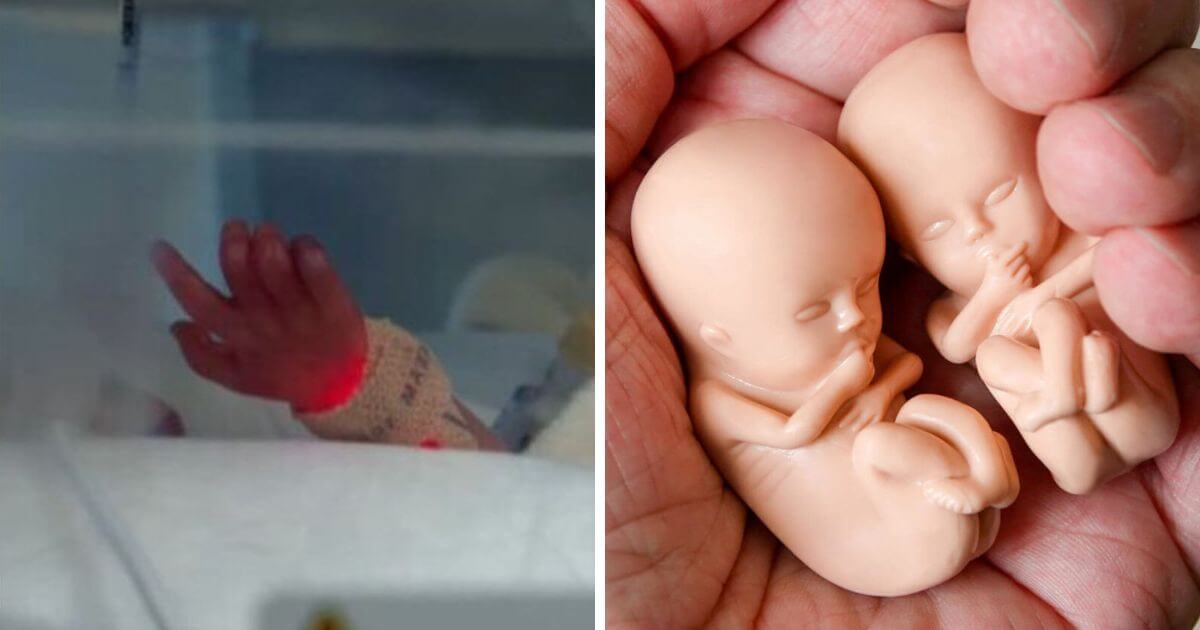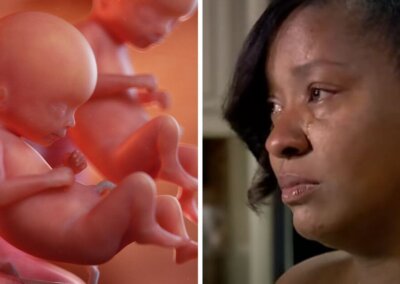A mum has spoken out about her experience of giving birth to extremely rare twins born a full 22 days apart.
Kayleigh Doyle, a mum from Manchester was pregnant with healthy twins and everything appeared to be going well until 22 weeks when her waters unexpectedly broke.
“When I hit 22-and-a-half weeks, literally, I was in bed and had the worst pain of my entire life”, she said. “I wasn’t sure what was going on, so I went to the toilet downstairs, and my waters broke”.
Kayleigh had to be rushed to hospital where she gave birth to her son Arlo. Sadly, being born so early, weighing only 1.1lb, Arlo was stillborn.
Doctors told Kayleigh to expect Arlo’s twin brother shortly afterwards and that devastatingly, she should not expect him to survive either.
Kayleigh said “[Arlo] looked like a normal baby. They sat me down after I gave birth, and told me they weren’t expecting ‘twin two’ to survive – and he’ll probably be born in the next couple of hours”.
22 days later, she gave birth to his twin brother
However, five days later, Kayleigh still had not given birth and doctors eventually sent Kayleigh home when her labour did not continue. She began making appointments with a doctor at a different hospital, who she said was “baffled” by how long the gap was between the twins’ births.
A full 22 days after she had given birth to her first son, Kayleigh delivered her second baby, Astro, via Caesarean section, after doctors discovered a placenta abruption, which might have deprived the baby of oxygen.
Astro weighed 2lb at birth, and survived in spite of complications including a hole in his heart and retinopathy. He is now three years old.
Kayleigh said “When Astro arrived I couldn’t believe he had survived all that time”.
Giving back after a traumatic experience
Reflecting on the period between Arlo and Astro’s births, Kayleigh said “I still found it really triggering whenever one of my doctors would ask me where ‘twin one’ is”.
“We’d bought double everything for the babies – two cots, a pram with two seats. It was hard seeing the twin mums I followed on TikTok recording all their milestones”.
However, after coming home with Astro and holding his twin brother’s funeral, Kayleigh chose to train as a neonatal intensive care unit volunteer.
“I heard an NICU charity was looking for volunteers in Manchester – looking for people to do stay-and-play sessions, and going to the cotside of premature babies. I went through a year of training – and you’ve got to have had a premature baby to do it”.
“I know what it’s like to feel in-the-dark about it – especially with the gap in between the two babies”, she went on. “As well as lonely – because everyone used to ask me where ‘twin one’ was. But I honestly can’t think of anything more rewarding. There is a light at the end of the tunnel”.
Medical advances have left a contradiction at the heart of our abortion law
Babies born as prematurely as Arlo at 22 weeks are in some cases able to survive with the right medical support. However, the annual abortion statistics for England and Wales in 2021 reveal that 755 “ground C” abortions were performed when the baby was at 22 or 23 weeks gestation (ground C is the statutory ground under which the vast majority of abortions are permitted and there is currently a 24-week time limit for abortions performed under this statutory ground).
According to a recent study, there were a total of 261 babies born alive at 22 and 23 weeks, before the abortion limit, who survived to discharge from hospital in 2020 and 2021.
This means in the same hospital, on the same day, two babies at the same gestational age (22 or 23 weeks gestation) could have very different fates – one could have his or her life deliberately ended by abortion, and the other could be born prematurely and have a dedicated medical team provide the best care they can to try to save his or her life.
Spokesperson for Right To Life UK, Catherine Robinson, said “This remarkable story of twins born 22 days apart is fascinating and shows that unexplained medical events continue to occur even with our modern scientific understanding. While it is tragic to hear of the death of baby Arlo, we are delighted that Astro has reached his third birthday and that the boys’ mother is able to use her experiences to give back to other premature babies and their families”.












